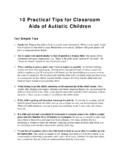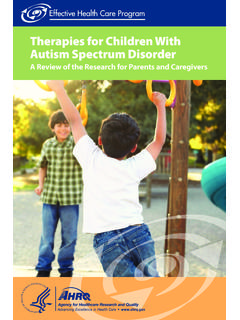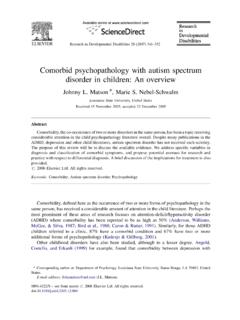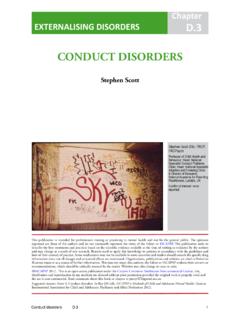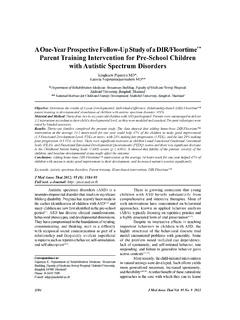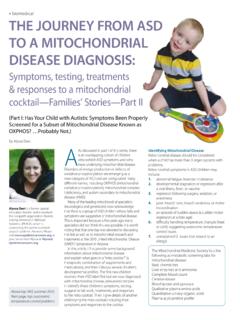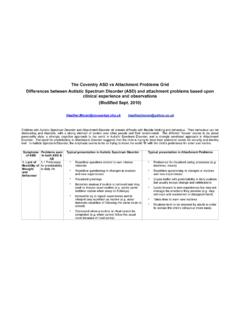Transcription of Why psychologists need to know about Lyme disease
1 Why psychologists need to know aboutLyme diseaseSarah L. MarzillierClinical Psychology Forum 194 February 200937 People with undiagnosed Lyme disease may pres-ent with chronic fatigue, mental health problems,neuropsychological impairments and autistic spec-trum disorders. This article considers the evidenceacross each of these areas, before discussing howpsychologists can recognise and support peoplewith Lyme DISEASEis a bacterial illness spreadby ticks. It is found all over Europe andNorth America. It is relatively rare in theUK, but the number of reported cases isincreasing (HPA, 2008).
2 It can be compli-cated by co-infections, as ticks often carryother bacteria and parasites that make thedisease more difficult to treat. People withundiagnosed Lyme disease may end up inpsychological services either because of thepsychological consequences of the illness orbecause the symptoms are mistaken for thoseof other disorders. People may be referredfor cognitive behaviour therapy for chronicfatigue syndrome, for the psychologicalmanifestations of Lyme disease , for neuro -psychological investigation of their cognitiveimpairments or for assessment of autisticspectrum disorders.
3 A purely psychologicalapproach will not be enough to help thosewith Lyme disease receive appropriate treat-ment. psychologists can play a crucial role inidentifying these people and referring themfor the antibiotic treatment that may trans-form their lives. Lyme disease is caused by spirochete bac-teria similar to the bacteria that causessyphilis. In the early stages of infection,around 30 60 per cent will have a character-istic bulls-eye rash (Stricker et al., 2005). Thismay be followed by mild to severe flu-likesymptoms. If untreated, the bacteria can dis-seminate to the central nervous system andcause a wide range of symptoms, includingfatigue, nerve, joint and muscle pain, cardiacproblems, neurological problems, difficultieswith mood, concentration and sleep, andother psychiatric problems.
4 The course canbe fluctuating, with periods of improvementand periods of relapse. If Lyme disease is notadequately treated, infection often persistsand affects a wide range of systems within thebody. Chronic fatigue syndromeDonta (2002) argues that Lyme disease is oneof several infectious causes of chronic fatiguesyndrome (CFS). He points out the largesymptom overlap between the two disorders:both consist of fatigue, neurocognitive dys-function, muscle and joint pain. There is evi-dence that Lyme disease can lead to achronic fatigue-type illness. Gustaw (2003)found that over 70 per cent of people with ahistory of Lyme disease met criteria for et al.
5 (2000) tested the blood of over1000 healthy young males and found that menwho tested positive for the bacteria that causesLyme disease showed significantly morechronic fatigue than those whose tests werenegative. However, other studies comparingpeople with CFS and healthy controls did notfind that the CFS group are more likely totest positive for Lyme disease (MacDonald etal., 1996; Schutzer & Natelson, 1999).Mental health problemsH jek et al. (2002) screened over 900 peoplewho were admitted to a psychiatric centre forantibodies to Lyme disease . They found that33 per cent of the psychiatric populationtested positive for Lyme disease , compared to19 per cent of a similar sized control a review article, Fallon and Nields(1994) reported studies linking Lyme diseaseSarah L.
6 Marzillier38 Clinical Psychology Forum 194 February 2009with major depression, panic attacks, paranoia,schizophrenia, bipolar disorder, dementia,anorexia nervosa and obsessive-compulsivedisorder. Of course, these problems maysimply be comorbid, or develop as a result ofdealing with an unpredictable complex ill-ness. However, there is reason to believe thatmental health problems can arise as a directconsequence of Lyme disease . Fallon et al.(1997) outline three strands of evidence sup-porting this view: the frequency of psychi-atric disorders is greater in people with Lymedisease than amongst other medical condi-tions; many people with Lyme diseasedevelop mental health problems without aprior psychiatric history; and these mentalhealth problems may improve after antibi-otic treatment alone.
7 Moreover, single pho-ton emission tomography (SPECT) studieshave shown that people with Lyme diseasetypically show multifocal areas of decreasedperfusion in the cortex and subcortical whitematter (see Fallon et al., 1997, for a review). Autistic spectrum disordersBransfield et al. (2007) have argued that Lymedisease may increase vulnerability for thedevelopment of autistic spectrum draw on evidence that shows that Lymedisease can be passed from an infectedmother to her unborn child and cause neuro -logical problems as well as vulnerability toother infections. These effects on the devel-oping body and brain may lead to autisticspectrum disorders.
8 They provide some evi-dence for this theory, reporting several stud-ies that show 20 30 per cent of people withautistic spectrum disorders are positive onblood tests for the Lyme disease impairmentsWestervelt and McCaffrey (2002) reviewed theliterature and found evidence of mostly milddeficits in verbal memory (particularly listlearning), verbal fluency, upper extremityfine motor speed/coordination and oralagility, and speed of processing problemsthat are consistent with primarily frontal sys-tems involvement. However, people withLyme disease have an idiosyncratic neuro -psychological profile and thus there may notbe a classic neuropsychological pattern asso-ciated with Lyme disease .
9 These impairmentsseem to be unrelated to the depression oftenfound in people with chronic Lyme disease ,and evidence suggests that they can improvewith antibiotic treatment (Westervelt &McCaffrey, 2002).In rare cases, Lyme disease can be associ-ated with other neurological problems suchas dementia, demyelinating disorders mim-icking multiple sclerosis, seizure disorders,hemiparesis, aphasia, ataxia and stroke(Westervelt & McCaffrey, 2002). In children, deficits in memory, readingcomprehension, handwriting skills, speechfluency, mathematics, visual skills and execu-tive functioning can all be a result of Lymedisease.
10 Alarm bells may be rung if one ormore of these problems occurs alongsidephysical symptoms of the illness ( fatigueand headaches) or uncharacteristic emo-tional or behavioural presentations. Hamlenand Kliman (2007) note that symptoms oftendevelop in a previously well-functioningchild, onset may be gradual, symptoms mayfluctuate over time and problems can beconfused with attention deficit disorder oroppositional defiant experience of Lyme diseaseThe experience of having such a complexand controversial illness can be devastatingto people and their families.


